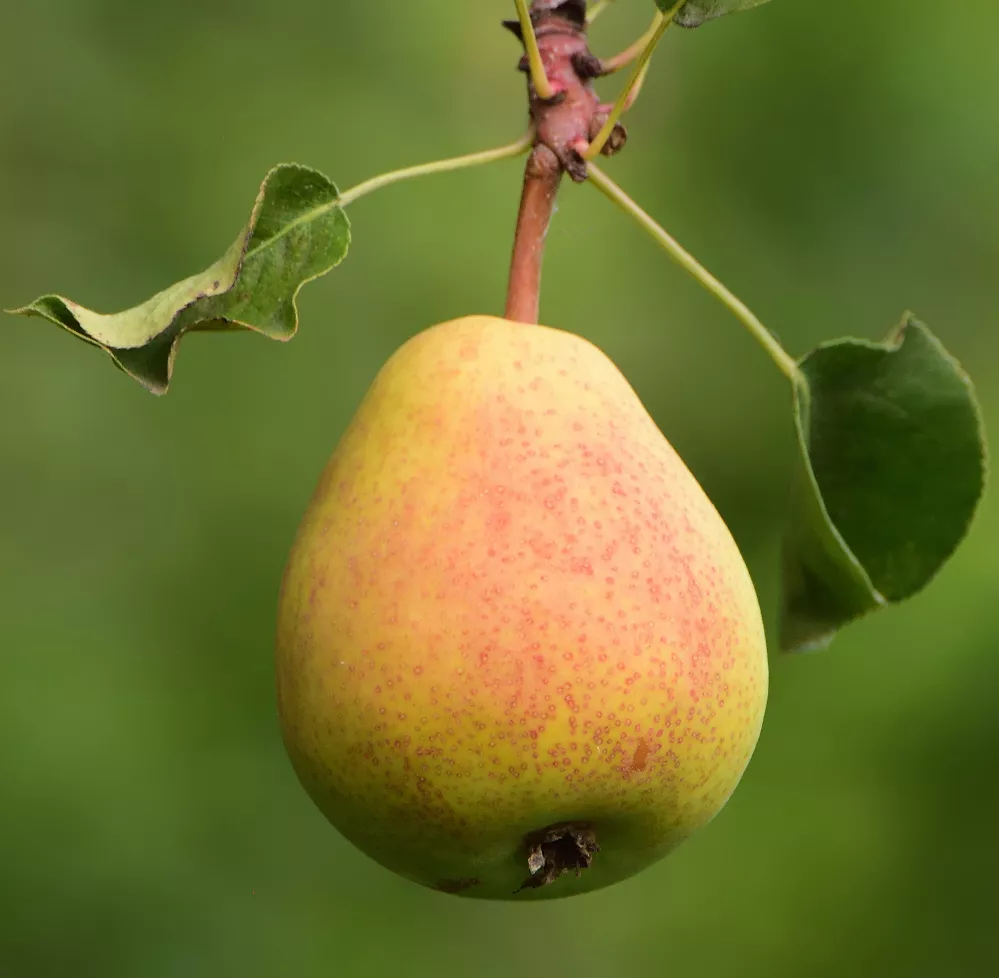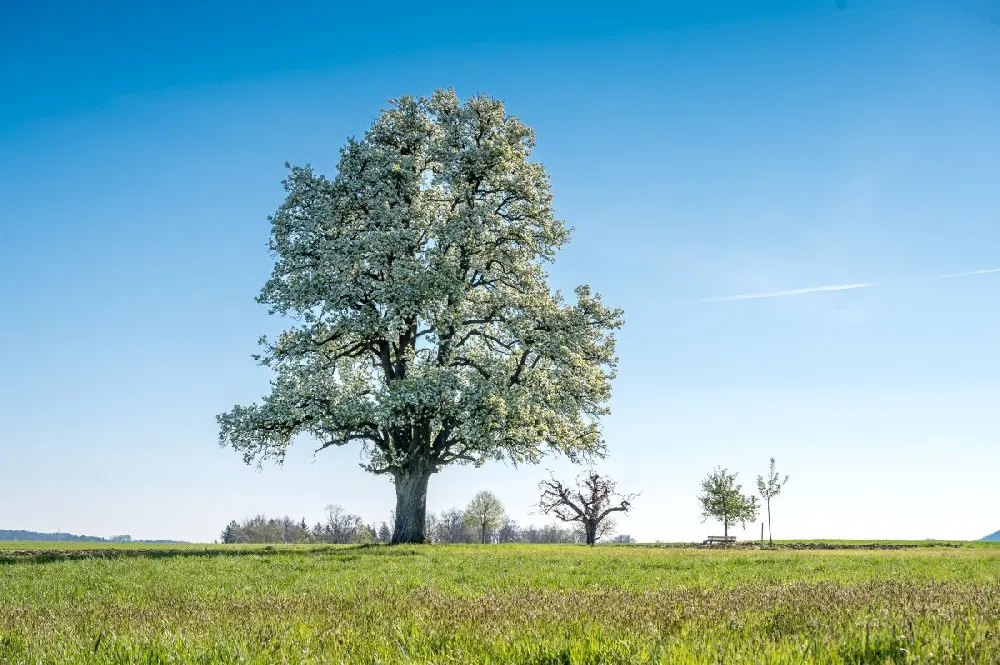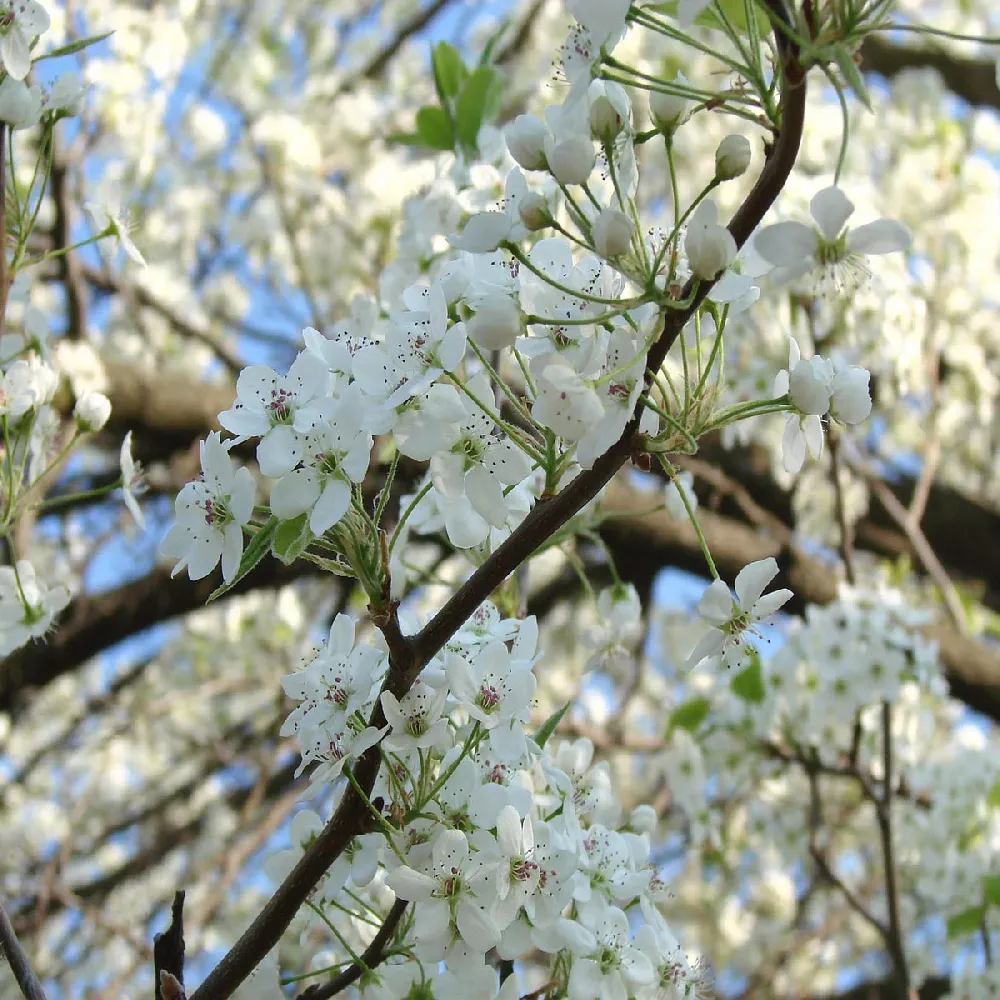- Home >
- Fruit Trees >
- Luscious Pear Tree
Luscious Pear Tree for Sale - Buying & Growing Guide
Pyrus communis 'Luscious,' better known as the Luscious Pear Tree, is responsible for producing some of the sweetest pears in existence. But, while this plant is most known for its fantastic fruit production, it also deserves recognition for the beauty it brings to the garden via its white springtime blooms and its dazzling fall color. Luscious Pear trees are also surprisingly adaptable and resilient as they can display all their best attributes, even in areas that have some air pollution.
- Luscious pears are some of the sweetest pears you can find.
- Luscious Pear trees are resilient and can survive urban pollution.
- Along with the delectable fruits, Luscious pears produce incredible flowers and fall foliage.
Enter your zip code to find nearby stores that may carry this plant.
Plant Care
Sunlight

Luscious Pear trees grow best in areas of full sunlight.
Watering
Water this tree about once every two weeks during the growing season.
Fertilizing

Feed this species with a balanced fertilizer once per year in early spring.
Planting and Care
Planting instructions
The essential requirements for a Luscious Pear Tree are full sunlight and soils that have great drainage and plenty of nutrients. If you find that the soil in your intended growing areas is lacking in any of these qualities, you should consider amending it with organic material such as compost, which can increase nutrient content and soil structure. After planting your Luscious Pear Tree in a hole that is as deep as the root ball is tall and at least twice as wide, you should backfill with more nutrient-rich soil while watering.
Watering and nutrients
After planting your Luscious Pear Tree, you should water it about once per week or more to allow the roots to become established. When your plant has gone through one or two growing seasons, it will need water about once every other week during the spring, summer and fall. However, you should be sure to not overwater your Luscious Pear or water it without considering how much moisture the plant has received from recent rainfall. Fertilizing for this plant is easy and should occur during early spring. When feeding, use a general-purpose fertilizer.
Pollination
One mild inconvenience about growing the Luscious Pear Tree is that this plant is not self-pollinating. What that means is that a single Luscious Pear Tree is not capable of producing fruits on its own. Instead, you’ll need to plant a Luscious Pear Tree alongside a companion pollinator tree to produce fruits. After planting these two trees, they will rely on pollinator species, including honeybees and several fly varieties, to conduct pollination. After successful pollination, fruit production begins shortly after.
Pruning
As is true for many plants, it is best to prune your Luscious Pear Tree during the late winter and early spring months. During that time, you should focus on creating a strong and relatively symmetrical form for this plant, which will allow it to develop fruits evenly throughout the canopy. You should also prune with the goal of removing any branches that are clearly dead or damaged. It also helps to thin the canopy to promote air circulation and prevent overcrowding.
Pests, diseases and animals
One great benefit of growing the Luscious Pear Tree is that this tree has excellent disease resistance. In fact, this plant was initially developed with the goal of it having resistance to fire blight. The success of that cultivation means that you won’t need to worry much about warding off disease when caring for a Luscious Pear. Likewise, the pest issues for this plant are quite low as well, but they remain more possible than disease problems.
Harvesting
After about three to five years of healthy growth, your Luscious Pear Tree will reach an age at which it is mature enough to bear fruit. That fruit typically emerges with a green color that transitions to a reddish hue. When early fall arrives, the fruits will develop a waxy outer surface, which indicates that they should be ripe and ready for picking. While each fruit should be relatively easy to remove, you should harvest with care to avoid harming your tree.
Achieving maximum results
Luscious pears will ripen somewhat after your harvest them, especially if you allow them to sit at room temperature. Once a Luscious Pear has reached peak ripeness, it is most common for people to use it as an ingredient in one of many dessert dishes with the softness and sweetness of this fruit’s flesh lending itself perfectly to that culinary role. If you wish to store your pears before eating them, one of the best ways to do so is to place them in a perforated bag in the fridge.
FAQs
What are the best pollinator companions for a Luscious Pear Tree?
Before planting a Luscious Pear Tree with the goal of producing a fruit harvest, you should understand that this tree needs a suitable pollinator companion. Fortunately, there are plenty of viable plant options that can perform well in this role. Some of the best companion plants to use to pollinate your Luscious Pear include the Bartlett Pear, Comice Pear, Summer Crisp Pear and Bosc Pear.
How did the Luscious Pear come into being?
The Luscious Pear Tree is a cultivated pear variety that has the botanical name Pyrus communis 'Luscious.' This cultivar arose as a cross between plant varieties known as South Dakota E31 and Ewart. The goal of crossing these two plants was to create a productive pear tree that has good disease resistance. Since its creation, the Luscious Pear has become one of the most common pears to use in many desserts.
How large does a Luscious Pear Tree grow?
Under the right care and conditions, the Luscious Pear Tree will grow to be about 15 feet tall with a slightly smaller width at maturity. Throughout its life, this tree maintains a relatively neat and conical form that allows it to fit neatly in most planting areas. As long as you give it about 10 to 15 feet of space on all sides, you should not expect any overcrowding.
Compare Similar Products
You can't add more Product Name - Product size to the cart.
OK








